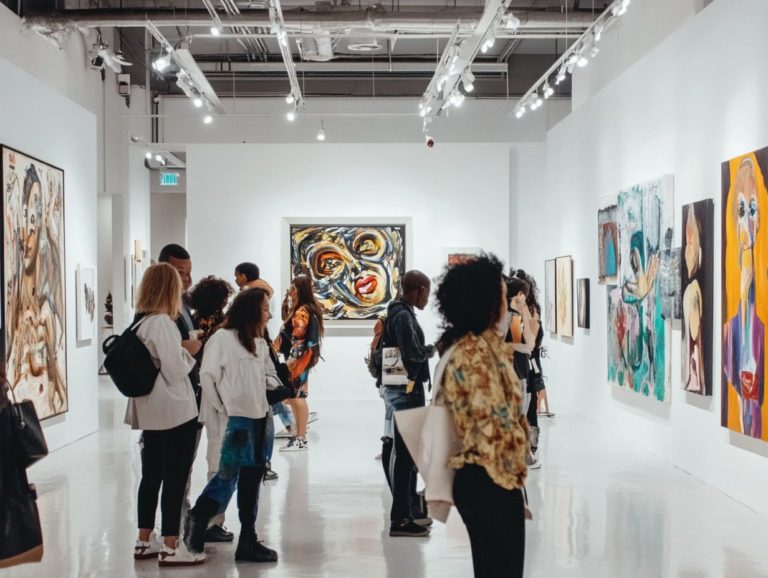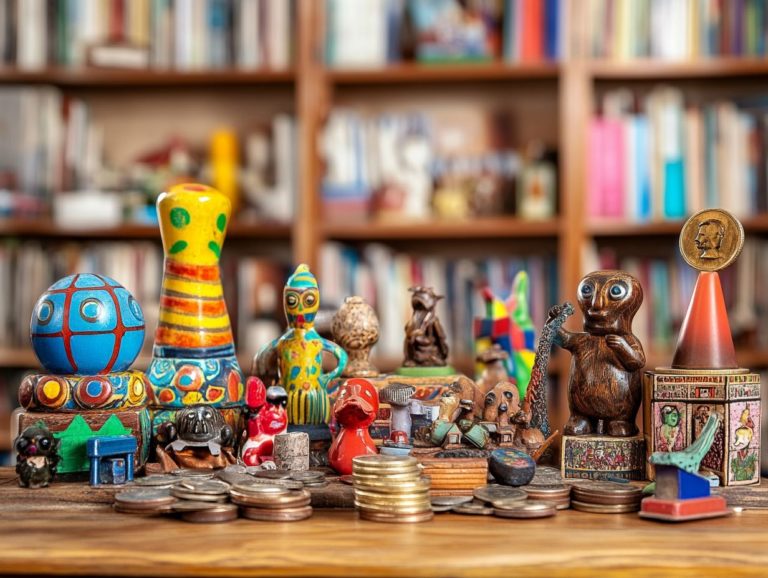Art Collecting: Navigating the Legal Landscape
Art collecting is not just an exciting journey; get ready to dive into an adventure brimming with passion and creativity. However, it’s essential to navigate this intricate landscape, where legal nuances are paramount.
This article delves into the vital legal framework surrounding art collecting, guiding you through the intricacies of copyright, ownership, and international laws. You ll discover key insights on authenticating artwork, ensuring proper documentation, and crucial factors to consider when selling your pieces.
Join in as you explore the legal considerations that can safeguard your investment while enriching your collecting experience.
Contents
- Key Takeaways:
- The Legal Landscape of Art Collecting
- Avoiding Legal Pitfalls in Art Collecting
- Legal Considerations When Selling Art
- Preguntas Frecuentes
- Cu les son las consideraciones legales a tener en cuenta al coleccionar arte?
- Qu es la procedencia y por qu es importante en la colecci n de arte?
- Puedo vender legalmente una obra de arte que he comprado?
- Qu debo hacer si sospecho que una obra de arte que poseo es una falsificaci n?
- Cu les son las leyes de derechos de autor relacionadas con la colecci n de arte?
- Necesito asegurar mi colecci n de arte?
Key Takeaways:
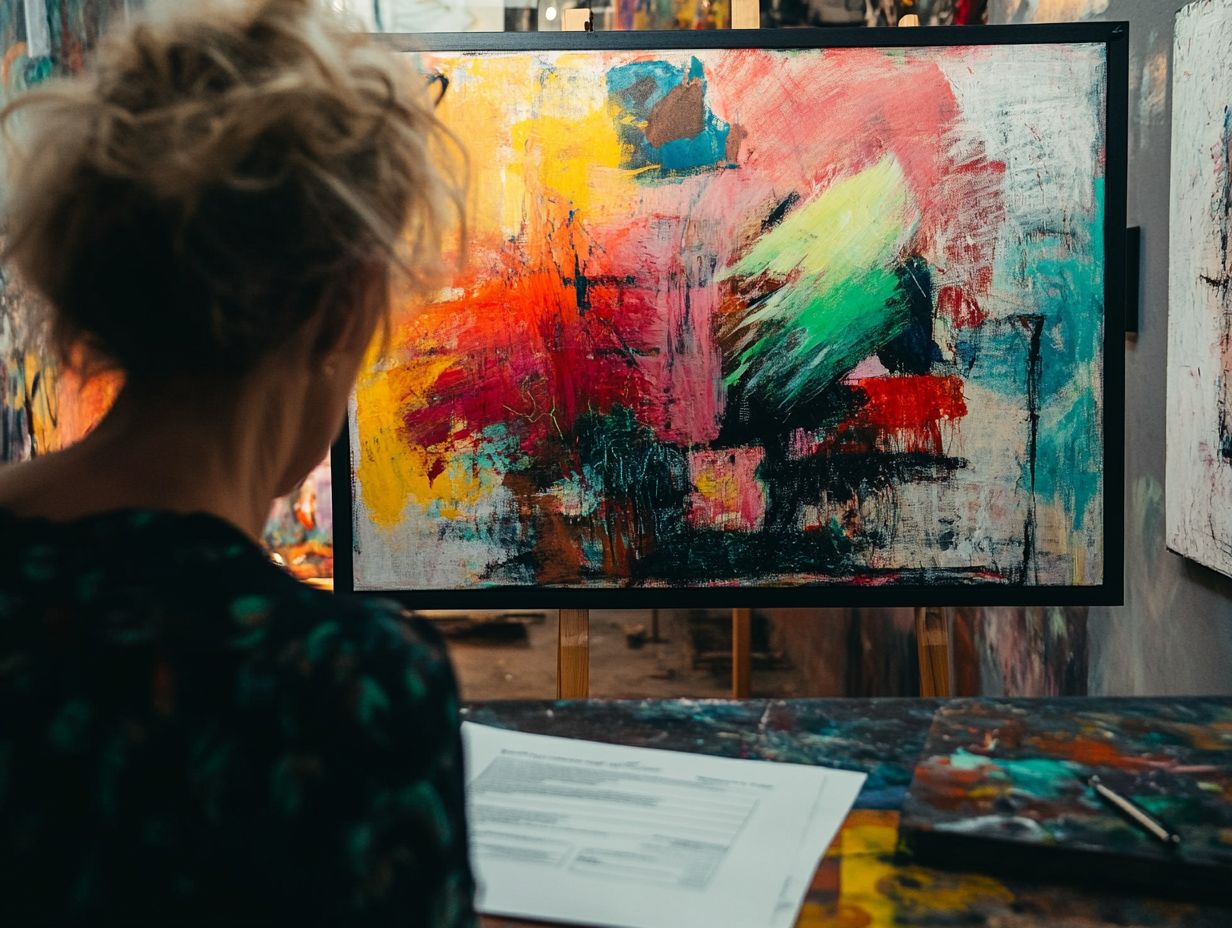
Understand the legal landscape of art collecting by familiarizing yourself with copyright laws and navigating international laws. Avoid legal pitfalls by authenticating artwork and ensuring proper documentation and history of ownership. When selling art, be aware of tax implications and regulations, as well as how to protect yourself from fraud.
What is Art Collecting?
Art collecting is a multifaceted adventure that invites you to acquire and appreciate a wide array of artworks, from paintings and sculptures to contemporary pieces and historical artifacts.
As an enthusiast, you might find yourself navigating various art forms sourced from reputable galleries and exhibitions. The art market has undergone a remarkable evolution, particularly in vibrant cities like New York, Chicago, and Los Angeles.
Engaging deeply with artists and their creations allows you to explore the rich cultural landscape while also weighing the investment value of your acquisitions. Historically, art collecting has transcended mere personal expression; it reflects societal values and cultural narratives.
Your motivations may range from passion and investment potential to a pursuit of social status, giving rise to different types of collectors some are casual admirers, while others are serious investors.
Galleries are pivotal in this landscape. They facilitate connections by showcasing diverse artists and styles while curating exhibitions that inspire and educate.
Contemporary art influences collecting practices, encouraging you to embrace emerging trends and transform your portfolio to align with modern artistic expressions.
The Legal Landscape of Art Collecting
Navigating the legal landscape of art collecting demands a clear understanding of various legal principles, particularly art law, which governs ownership, authenticity, and exploring art collecting in New York City.
This knowledge is essential for collectors and advisors alike, as it gives them the power to safeguard their investments and preserve cultural heritage.
Legal challenges can manifest in numerous ways, including art theft, disputes regarding authenticity, and intricate procedures associated with auction houses or galleries.
Understanding Copyright and Ownership
Understanding copyright and ownership is crucial in the world of art collecting, as it shapes the rights of both the creator and you, the collector. Copyright law safeguards the rights to the artwork of artists, ensuring their works aren t exploited without their consent.
Ownership pertains to the legal possession and transfer of the artworks. Navigating these complex layers is essential for everyone, whether you’re a seasoned collector or just starting your journey.
It impacts not only the intrinsic value of the art but also the legal responsibilities tied to it. For instance, when you acquire a piece, you may hold the physical artwork, but the copyright typically remains with the artist unless it s specifically transferred.
This distinction underscores the importance of grasping the limitations around exhibitions, reproductions, and resale of art pieces. You must tread carefully, as any misstep could lead to unwanted legal disputes or accusations of infringement.
This reality highlights the necessity for clear contracts and diligent research in all your transactions. Act fast to avoid legal disputes that could jeopardize your collection!
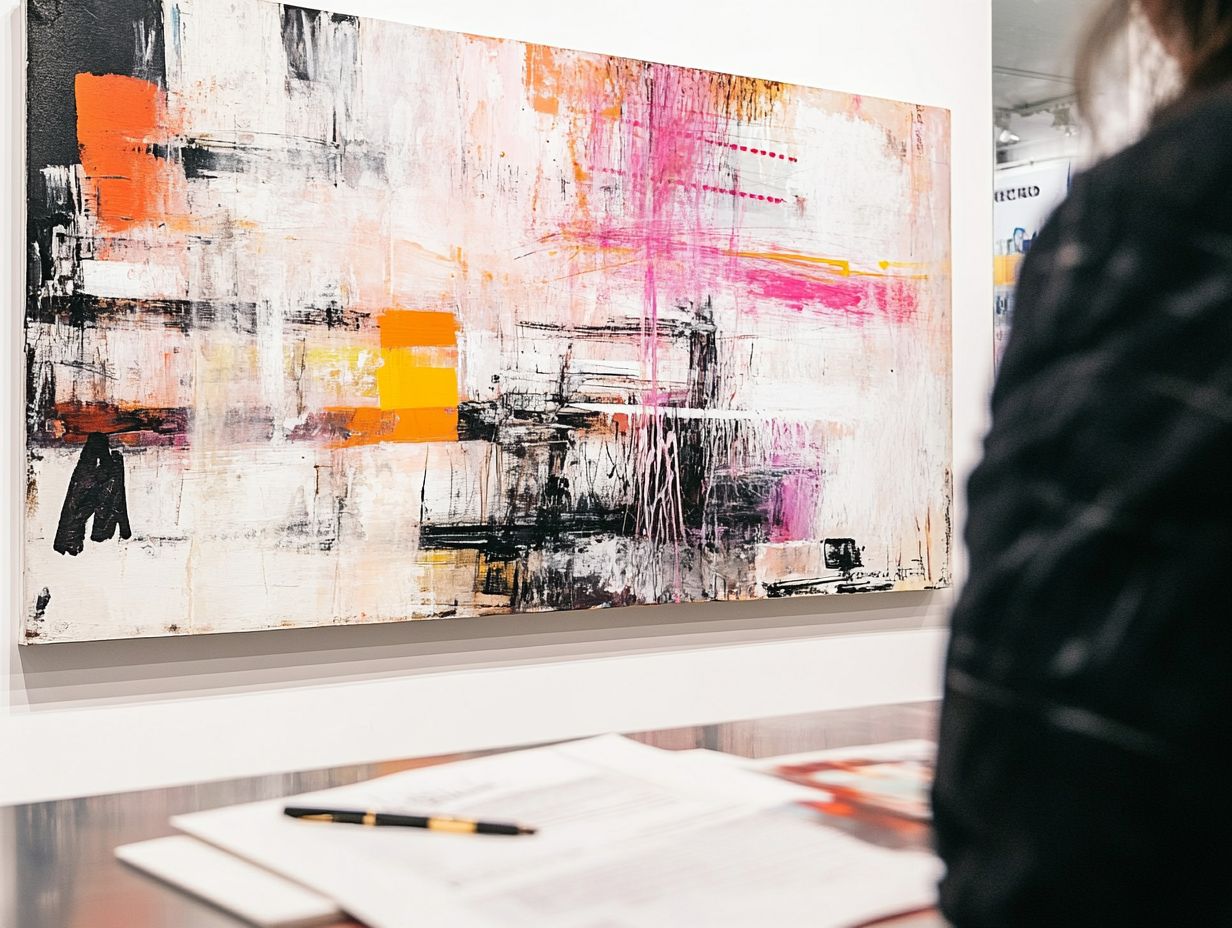
Navigating international laws poses unique challenges for art collectors, particularly regarding cultural history and the authenticity of artworks acquired from various countries. You need to be aware of the different legal frameworks that govern art transactions across borders, as these laws can vary significantly.
Import and export restrictions add to this complexity. These regulations safeguard national treasures and cultural history. Compliance with international conventions, like the UNESCO convention on cultural property, adds another layer of responsibility for those looking to curate a diverse and valuable collection.
Ensuring the provenance and authenticity of artworks isn t just a best practice; it s essential for maintaining legal integrity and protecting your investment. When acquiring art from abroad, it’s crucial to thoroughly research the documentation accompanying each piece.
Any oversight could lead to significant legal repercussions and ethical dilemmas down the line, so diligence is key.
Avoiding Legal Pitfalls in Art Collecting
Avoiding legal pitfalls in art collecting is essential for you, whether you’re a novice or a seasoned collector. These challenges can result in substantial financial and legal repercussions that you want to avoid.
By familiarizing yourself with potential issues like art theft, forgery, and inadequate documentation, you can protect your investments and preserve cultural history. Prioritizing this knowledge ensures that your passion for art doesn’t lead to unnecessary complications.
Tips for Authenticating Artwork
Authenticating artwork is crucial for you as a collector to ensure that your investments are both genuine and valuable. The risk of forgeries in the art market is significant, making professional appraisals and thorough documentation essential for verifying authenticity and provenance. This ultimately gives you peace of mind.
Engaging certified appraisers with specialized knowledge in various art periods and styles is valuable. Many collectors like you also find insights from art advisors helpful. These experts provide invaluable information about market trends and investment potential.
The importance of comprehensive documentation cannot be overstated. Detailed records of an artwork s history clarify its narrative and serve as crucial evidence if disputes arise. Provenance, or the previous ownership history of the artwork, can greatly enhance its value and desirability.
Experienced collectors, including you, develop an eye for potential red flags think inconsistent signatures or incongruent stylistic elements that could suggest a work’s dubious authenticity. By employing these methods and resources, you can navigate the complexities of the art market with greater security.
Ensuring Proper Documentation and Provenance
Ensuring proper documentation and provenance is essential in art collecting, as these elements prove where an artwork has been and why it matters. You should prioritize maintaining comprehensive records to support your claims of authenticity and ownership. This can ultimately enhance the artwork’s value in the market.
Certificates of authenticity, purchase records, and exhibition history are crucial types of documentation you must keep. These documents verify the artwork’s origin while preserving its cultural significance over time.
By tracing the provenance, you can uncover the journey of each piece, revealing previous owners, galleries, or exhibitions. This information significantly impacts both the artwork’s legal standing and its market value. Understanding who has owned a piece and how it has been valued in the past is crucial, as this can protect you from legal disputes.
Legal Considerations When Selling Art
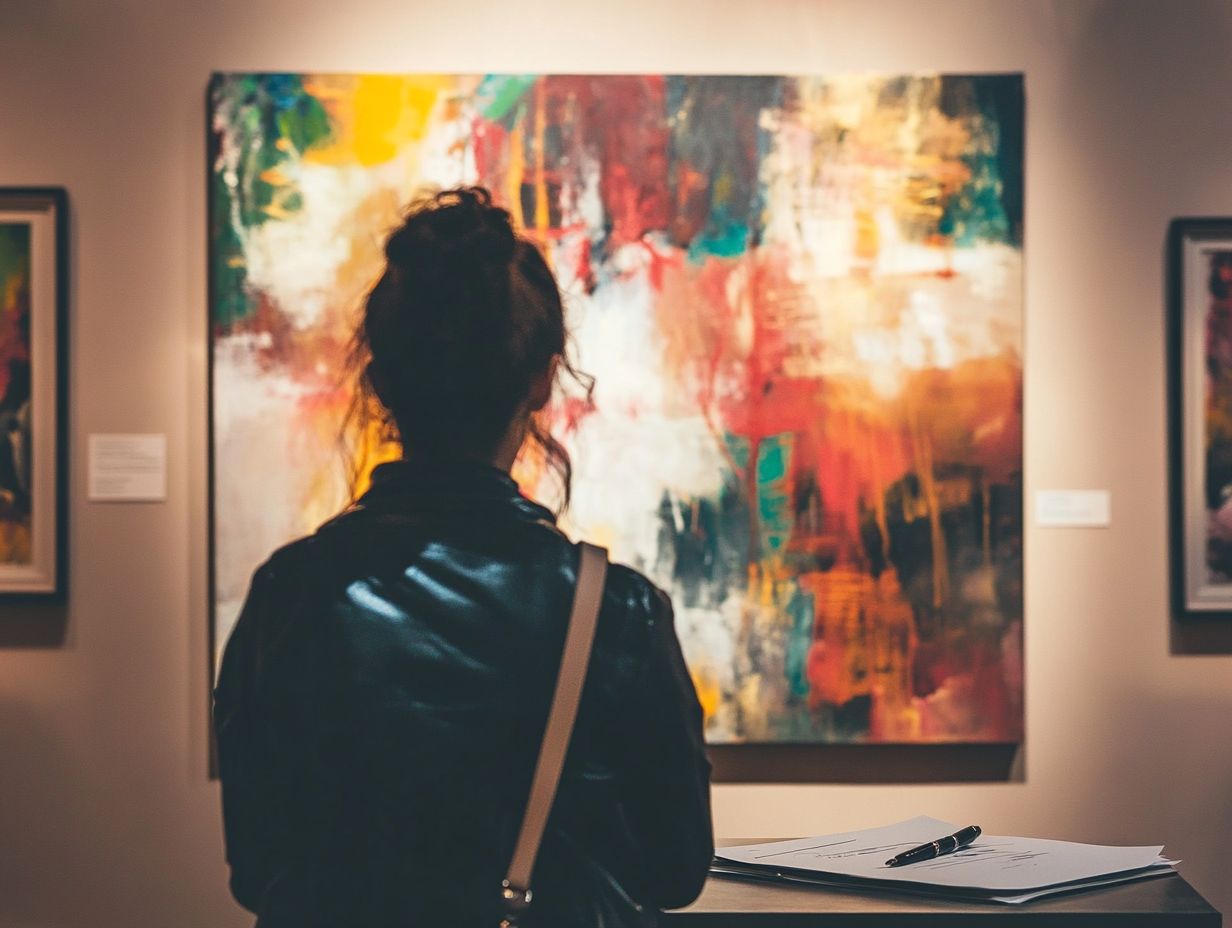
When selling art, grasping the legal considerations is crucial for maximizing your profit and ensuring compliance with relevant regulations.
You must carefully navigate factors like tax implications, potential fraud, and the protocols of auction houses. This diligence safeguards you and protects the intrinsic value of the artwork.
Stay informed and proactive in your art collecting journey to safeguard your investments!
Tax Implications and Regulations
Tax implications and regulations can profoundly affect you as an art collector. They impact your profit margins and financial planning.
It s essential to grasp how capital gains tax, which is a tax on the profit made when selling an asset like art, and other regulations apply to art sales. This knowledge is fundamental for responsible collecting and investment.
Navigating these financial obligations is vital; undervaluing or misreporting can lead to hefty penalties. Be mindful of specific reporting requirements that differ by jurisdiction, as local laws may impose additional stipulations.
Making a plan like holding onto artworks for extended periods to potentially reduce your capital gains taxable income or utilizing like-kind exchanges can help mitigate tax liabilities.
It s important to consult tax professionals who know about art transactions. Their expertise can offer tailored advice to optimize tax efficiency while ensuring compliance with federal and state regulations.
Protecting Yourself from Fraud
Protecting yourself from fraud is crucial in the world of art collecting, where the market can be filled with forgeries and scams targeting unsuspecting buyers. By implementing due diligence measures and using professional help, you can significantly reduce the risk of falling prey to art fraud.
Conduct thorough research on both the artwork and the seller to uncover potential red flags that might indicate a scam. Engaging with reputable galleries and auction houses often gives you access to vetted pieces and reliable information.
Seeking expert guidance from art consultants or appraisers ensures you have an informed perspective before making any purchases. Stay vigilant about common tactics such as suspiciously low prices, lack of provenance, or vague seller backgrounds that can help you avoid deceitful practices in the art market.
Ultimately, continuous education about the field, combined with a proactive approach, is essential for safeguarding your investments. It s thrilling to collect art, so stay sharp to protect your treasures!
Final Thoughts on Art Collecting and the Law
The intersection of art collecting and the law offers you both opportunities and challenges.
By grasping the legal landscape, ensuring authenticity, and tapping into professional resources, you can protect your investments and navigate this complex field with confidence.
As you delve deeper into this intricate world, it s essential to familiarize yourself with various facets, such as copyright issues, provenance which means the history of ownership of the artwork and the subtleties of international art markets. Legal awareness not only safeguards your valuable pieces but also enriches your overall experience of collecting art.
For those who are passionate about building a meaningful collection, understanding the significance of legal considerations can be the difference between a secure investment and potential disputes.
Engaging in ongoing education, seeking expert advice, and actively participating in community resources are crucial elements that foster a secure collecting environment for you.
Preguntas Frecuentes
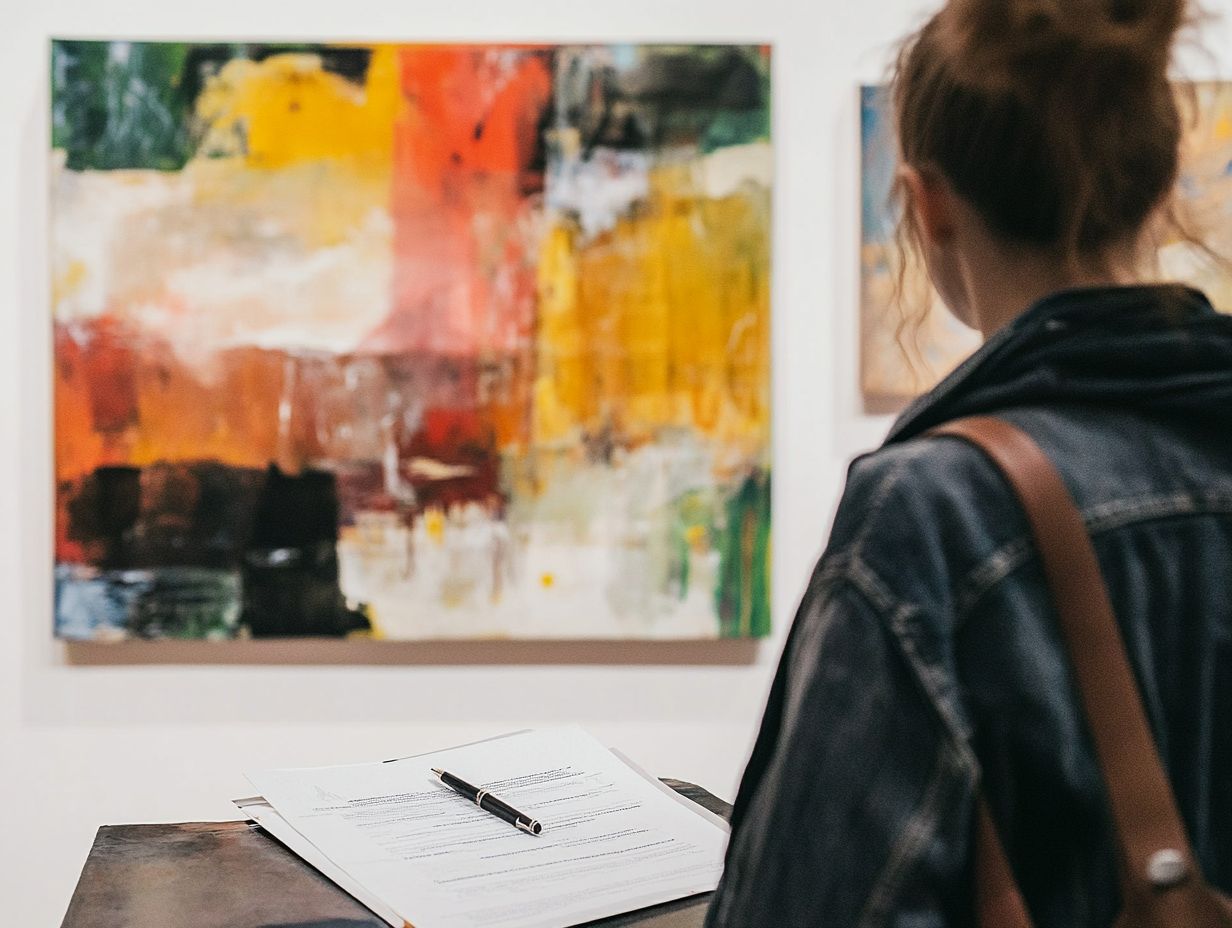
Cu les son las consideraciones legales a tener en cuenta al coleccionar arte?
Al coleccionar arte, es importante considerar factores legales como la propiedad, autenticidad, procedencia y derechos de autor. Estos factores pueden afectar el valor y la legalidad de la obra de arte en tu colecci n.
Qu es la procedencia y por qu es importante en la colecci n de arte?
La procedencia se refiere a la historia de propiedad y posesi n de una obra de arte. Es importante en la colecci n de arte ya que puede impactar la autenticidad y el valor de la obra. Una procedencia clara y documentada tambi n puede proteger contra posibles problemas legales.
Puedo vender legalmente una obra de arte que he comprado?
S , puedes vender legalmente una obra de arte que has comprado siempre que tengas una propiedad y t tulo claros. Es importante mantener la documentaci n de la venta y la transferencia de propiedad para protegerte contra cualquier disputa legal futura.
Qu debo hacer si sospecho que una obra de arte que poseo es una falsificaci n?
Si sospechas que una obra de arte en tu colecci n es una falsificaci n, es importante buscar la opini n de un experto y, potencialmente, hacer que la obra sea autenticada. Si se confirma que es una falsificaci n, debes contactar al vendedor o a la casa de subastas para posibles acciones legales.
Cu les son las leyes de derechos de autor relacionadas con la colecci n de arte?
Las leyes de derechos de autor protegen a los creadores originales de una obra de arte. Estas leyes aseguran que los artistas tengan derechos sobre la reproducci n, distribuci n y exhibici n de su trabajo.
Al coleccionar arte, es crucial obtener los permisos y licencias necesarios. Esto te permite disfrutar y exhibir las obras de manera legal.
Necesito asegurar mi colecci n de arte?
Es fundamental asegurar tu colecci n de arte. Esto te protege contra da os, p rdidas o robos potenciales.
Consulta con un profesional de seguros especializado en arte y coleccionables. Aseg rate de tener la cobertura adecuada para tu colecci n.



